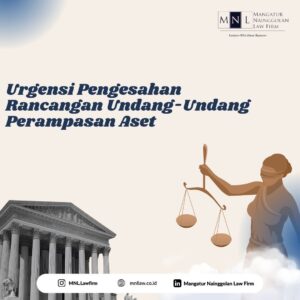
The eradication of Corruption Crimes (“TIPIKOR“) has been one of the top priorities in the post-reform era, especially since pre-reform times were often marred by allegations of corrupt practices that went unexposed.
To combat TIPIKOR, the Government of the Republic of Indonesia has taken various measures, including the establishment of the Corruption Eradication Commission (KPK), the revision of Law No. 31 of 1999 on the Eradication of Corruption Crimes, and the introduction of new evidentiary methods in TIPIKOR trials.
Recently, discussions have emerged regarding a bill on the confiscation of assets obtained from corruption crimes. This bill is designed to protect property rights by ensuring that illegally acquired assets are returned to the state. The proposed Asset Forfeiture Bill aims to address these issues by establishing a legal mechanism that allows for asset recovery without requiring a court verdict.
The primary objective of this bill is to prevent perpetrators from benefiting from the proceeds of corruption. At the same time, it upholds human rights principles, complies with existing regulations, and adheres to fair and transparent legal procedures.
Challenges in Enacting the Asset Forfeiture Bill
In reality, passing the Asset Forfeiture Bill is not as simple as flipping one’s hand. Missteps by law enforcement could lead to widespread negative consequences for society.
Based on the United Nations Convention against Corruption (UNCAC, 2003), the recovery of assets from convicted corruption offenders can be pursued through criminal or civil means. The criminal process involves four key stages:
- Search and Seizure– Locating and identifying assets linked to corruption.
- Confiscation– Transferring control of assets to authorities to prevent disposal by the perpetrator.
- Management and Preservation– Ensuring seized assets remain in good condition.
- Asset Recovery– Returning confiscated assets to the state.
Although the Asset Forfeiture Bill could significantly deter corruption by imposing stricter penalties, its enactment has been repeatedly delayed by the government and the House of Representatives (DPR RI) for unclear reasons.
According to Deputy Minister of Law and Human Rights Edward Omar Sharif Hariej, several obstacles have hindered the bill’s passage. Even by 2025, it remains unsigned, despite the government’s claim of receiving presidential support from Joko Widodo in 2023.
Another major concern is the potential conflict with human rights (HAM). Critics argue that asset forfeiture could violate the presumption of innocence, as guaranteed under Article 28H(4) of the 1945 Constitution, which states that no one’s property may be arbitrarily seized.
Accelerating the Enactment of the Asset Forfeiture Bill
The bill holds great potential as a legal foundation for efficiently resolving corruption cases. It could also reduce corruption by preventing perpetrators from enjoying illicit gains. The government must strengthen coordination to expedite its enactment, ensuring a corruption-free Indonesia that upholds justice and optimizes state resources.
While concerns about human rights violations persist, there are ways to mitigate them. For example:
- Reverse Burden of Proof (as stipulated in Article 77 of the Money Laundering Crimes Law).
- Adopting UNCAC’s “lower balanced probability” theory to assess whether assets are proceeds of corruption while maintaining a high threshold for restricting personal freedom.
By addressing these challenges, the bill can be implemented effectively without compromising fundamental rights.
